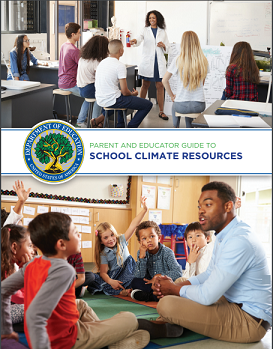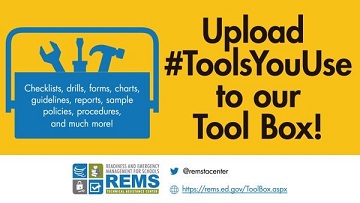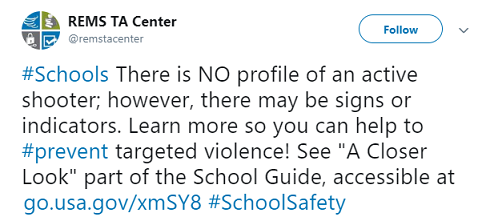|
Join us between now and September as the REMS TA Center hosts our Summer School and Campus Safety Series. On a weekly basis, we will share resources, host Web chats and/or conduct Webinars on key topics in K-12 and higher ed safety, security and emergency management. Email info@remstacenter.org to get the latest information on how to stay engaged or follow us on Twitter @remstacenter.
Topical Resource Feature
This section of our newsletter features resources relevant to seasonal trends, current events, and other timely topics in the field.
School buses transport students to/from school and serve as the working environment for school bus drivers every day; transport students, teachers, support staff, and/or parents to/from field trips throughout the school year; and are used by extended student services/on-campus daycare programs during the summer to transport students and staff to/from off-campus activities. Since emergency events can happen at any time, schools and school districts need to be prepared to keep students, staff, and visitors alike safe on school buses throughout the calendar year. School buses could crash (like the incident described in this Lessons Learned publication), but they could also experience or be affected by earthquakes, flooding, winter precipitation, lightning, tornadoes, tsunamis, hazardous materials releases, bullying, crime, infectious diseases, etc. For this reason, it is recommended that schools and school districts incorporate school buses into their EOPs (e.g., via a school bus annex) and have transportation staff on their planning team.
The Tool Box houses resources developed by your peers, some of which can help plan for emergency events on school buses. The Lincoln County School District in Oregon created a School Bus Emergency Operations Plan, as well as accompanying training videos: Part 1: Basic Protocols, Part 2: Hazards, and Part 3: Threats & Violence. Additionally, the Iowa Department of Education created a Bus Crash Tabletop Exercise that may be used by schools and school districts to engage in scenario-based planning and/or identify gaps and weaknesses in their EOP.
For more resources on planning for emergency incidents that can happen in all settings and during all times, please visit https://rems.ed.gov/Resource_Plan_Basic_All_Setting.aspx.
|
|
Functional Resource Feature
This section of our newsletter features resources that can support education agencies and their community partners with efforts to strengthen emergency management functions and overall preparedness capacity.
An Overview of the ED’s New Parent and Educator Guide to School Climate Resources
 In response to the recommendations from the Federal Commission on School Safety, the U.S. Department of Education’s Office of Elementary and Secondary Education and Office for Special Education and Rehabilitative Services collaboratively produced the Parent and Educator Guide to School Climate Resources, which was released in April 2019. This Q&A-style document provides school leaders, teachers, and parents with best practices to develop positive and inclusive school environments, as well as tools and resources to implement these practices. The interventions detailed aim to promote safe and supportive schools, with a goal of a decrease in disciplinary issues and improved school safety. Information on the School Climate Transformation Grant Program, which is funded by ED to support SEAs and LEAs as they implement practices to improve school climate, is also included in this guide, as well as resources that help schools assess their climate, so they may better understand their own unique needs. When schools have a firm grasp on their specific needs, strengths and growth areas, they can more effectively plan for improvement. As the school climate becomes more positive, students may be less likely to engage in bullying behaviors or have disciplinary issues. This new resource provides a comprehensive framework for school officials and parents to foster social and physical safety in our nation’s schools.
In response to the recommendations from the Federal Commission on School Safety, the U.S. Department of Education’s Office of Elementary and Secondary Education and Office for Special Education and Rehabilitative Services collaboratively produced the Parent and Educator Guide to School Climate Resources, which was released in April 2019. This Q&A-style document provides school leaders, teachers, and parents with best practices to develop positive and inclusive school environments, as well as tools and resources to implement these practices. The interventions detailed aim to promote safe and supportive schools, with a goal of a decrease in disciplinary issues and improved school safety. Information on the School Climate Transformation Grant Program, which is funded by ED to support SEAs and LEAs as they implement practices to improve school climate, is also included in this guide, as well as resources that help schools assess their climate, so they may better understand their own unique needs. When schools have a firm grasp on their specific needs, strengths and growth areas, they can more effectively plan for improvement. As the school climate becomes more positive, students may be less likely to engage in bullying behaviors or have disciplinary issues. This new resource provides a comprehensive framework for school officials and parents to foster social and physical safety in our nation’s schools.
|
|
Help Desk Request Snapshot
This section of our newsletter highlights a noteworthy topic among technical assistance inquiries received from the field during the last quarter.
A Focus on Resilience Strategies for Educators
The REMS TA Center recently received a request from a school district seeking to evaluate the impact of resilience-focused trainings, including our Resilience Strategies for Educators training, on educators and other key stakeholders who support school safety. Resilience is the process of adapting well in the face of adversity, trauma, tragedy, threats or significant sources of stress; it means "bouncing back" from difficult experiences.
The desire to measure caregiver behavior change after training could be accomplished by choosing to measure behaviors that might indicate trauma or compassion fatigue, and/or those included in self-care planning. Evidence of just one or two indicators does not mean that a caregiver is experiencing a need for support. However, measuring these behaviors could show a change related to receiving RSE training.
Suggestions for Evaluating Your Program
Trauma/Compassion Fatigue
Your agency may choose to measure behaviors that show a potential need for support. Some of those described in Understanding Educator Resilience & Developing a Self-Care Plan are:
- Changes in routine;
- Changes in interactions with others; and
- Sleep disturbances.
You might plan to formally assess changes in routine by pulling attendance records from your schools’ timekeeping system. Then, you could choose to compare the records of individual caregivers over time (e.g., Mrs. Smith had a decrease in absences or late arrivals over the course of a year), or you could choose to compare the records of the whole group of trained caregivers vs. the group of caregivers who did not attend RSE training (for example, six months after the training, the trained caregivers had fewer absences as a group than the untrained caregivers).
An informal assessment might be asking caregivers to keep sleep journals and then respond to an anonymous survey about sleep disturbances.
Self-Care Planning
There are a lot of options when planning to assess behaviors that show growth. As you can see in Understanding Educator Resilience & Developing a Self-Care Plan, these behaviors fall into four categories:
- Identifying what they need to succeed in prioritizing self-care
- Development of self-care plan (elements include physical, emotional, cognitive, social, financial and physical)
- Managing challenges to self-care
- Commitment actions for self-care behaviors (things like getting a self-care buddy)
Each of these four categories contains behaviors a caregiver can do to progress in self-care. You could choose any behaviors in any of the four categories that make sense for your communities and program. For example, three months after RSE training, how many caregivers have developed a self-care plan? This could be a formal assessment, where you collect the plans.
Or six months after RSE training and developing a self-care plan, how many caregivers feel they have improved their ability to manage challenges to self-care? This could be an informal assessment, using anonymous surveys. There is a wide range of data collection to use in this area to show a change in behavior.
For more information on behaviors that are related to trauma and compassion fatigue (indicating a potential need for support) and behaviors related to self-care (indicating potential growth), we suggest you review the Webinar Understanding Educator Resilience & Developing a Self-Care Plan. It describes the many ways in which trauma and compassion fatigue manifest in caregivers (in physical, emotional, behavioral, cognitive, interpersonal, spiritual, and professional aspects), explains how to develop a self-care plan, and provides suggestions for overcoming roadblocks to self-care and provide support for those working to improve their self-care.
Vote in the Voices from the Field poll What does your school/district/community need MOST to promote student resilience?
|
|
#REMSontheRoad Spotlight
This section of our newsletter features details specific to the REMS TA Center Training by Request (TBR) and #REMSontheRoad Program.
Upcoming Trainings
The REMS TA Center offers a variety of TBRs for delivery on site at schools, school districts, or IHEs. For each training, we provide—free of charge—training materials, as well as one or more expert trainers and TA Center staff support for the event hosted at your site. To date, we have provided TBRs to more than 10,000 participants in 46 states, and in several territories. Check out the list of states on our calendar for July!
- 7/11 - K–12 TtT in Knoxville, TN
- 7/22 – RSE TtT in Grand Island, NE
- 7/23 – RSE TtE in Grand Island, NE
- 7/24 – RSE TtT in Nebraska City, NE
- 7/25 – RSE TtE in Nebraska City, NE
Download the REMS TA Center Trainings by Request: At a Glance document for more information on our training topics: https://rems.ed.gov/docs/TBRs_At-a-Glance_508C.pdf and view trainings we are hosting in April and May.
Curious about whether a training is already scheduled in your area? Check out upcoming TBRs we have scheduled across the country by accessing the #REMSontheRoad forums on the REMS TA Center Community of Practice (CoP) or by viewing the graphic featured here. You can also share your experiences at any time with @remstacenter via Twitter using the #REMSontheRoad hashtag.
|
|
Virtual Networking Corner
This section of our newsletter features highlights from our interactions with the field via Twitter, the CoP, and other virtual events and networking platforms.
Upcoming and Archived Webinars and Web Chats
Join us on Wednesday, July 17, 2019, from 12 p.m. to 1 p.m. ET as the Office of Safe and Supportive Schools (OSSS) within the U.S. Department of Education (ED), and its REMS TA Center will host the FIRST Web chat in our #REMSChatWithanExpert series, which will take place from July 17 to September 3 and cover the topics of recovery, the role of the SEA in summer emergencies, bereavement and loss, reunification, school transportation safety, back to school preparedness, and more. The first chat in the series will feature David J. Schonfeld, MD, FAAP, the Director of the National Center for School Crisis and Bereavement and the Professor of the Practice of the Suzanne Dworak-Peck School of Social Work and Pediatrics in Children’s Hospital Los Angeles at the University of Southern California, and focus on the topic of recovery. We encourage anyone who plays a role or has an interest in school safety and preparedness, and emergency management to tune in for this chat and upcoming ones by following us on Twitter.
To join next week's chat, visit our Community of Practice at https://rems.ed.gov/COP/REMSCOPforum/topics.aspx?ForumID=153. It is free and easy to become a member. ind details on the next two chats in the #REMSChatWithanExpert series below.
Also join us on Thursday, July 25, 2019, from 12 p.m. to 1 p.m. ET, where we will host our second Summer Chat with an Expert series on Twitter. This chat in the series will feature Mike Donlin, Program Supervisor for the Washington School Safety Center, and focus on the topic of the role of the SEAs in summer emergencies.
Our third Summer Chat with an Expert series will be hosted on Thursday, August 1, 2019, from 12:00 p.m. to 1 p.m. ET, on Twitter. During this chat, we will be joined by Anne-Marie McLaughlin, CEM, MEP, CBCP, Director of Emergency Management and Continuity in the Department of Public Safety at New York University to discuss the topic of integrating students with access and functional needs at the higher ed level. Follow the hashtag, #REMSChatWithanExpert, to tune in!
On Wednesday, July 31, 2019, from 2:00 p.m. to 3:00 p.m. ET, the Office of Safe and Supportive Schools (OSSS), formerly known as the Office of Safe and Healthy Students within the U.S. Department of Education (ED), and its REMS TA Center will host a Webinar to highlight impacts of lead exposure on the learning environment and steps education agencies can take to integrate lead testing and reduction programs into school emergency management planning and emergency operations plans. Victoria Ellenbogen, from the U.S. Environmental Protection Agency’s (EPA) Office of Ground Water and Drinking Water, Drinking Water Protection Division will also join the Webinar to share insight on this topic and details on EPA tools available to support states and localities with lead testing and reduction. This event will also feature a dedicated 15-minute Q&A session during which presenters will field questions from participants. To join the meeting, register here:
http://remstacenter.org/webinars/WebinarRegistration.aspx?WebinarID=3096.
Presenters:
Madeline Sullivan, U.S. Department of Education’s (the Department/ED) Office of Safe and Supportive Schools (OSSS); Victoria Ellenbogen, the U.S. Environmental Protection Agency’s Office of Ground Water and Drinking Water, Drinking Water Protection Division; and Janelle W. Hughes, REMS TA Center.
Did you miss one of our recent webinars? You can view these and past webinars on our website:
-
Trauma-Informed Care for Schools Before, During, and After Possible Emergency Events
On Wednesday, June 26, 2019, ED’S OSSS and REMS TA Center hosted a Webinar on trauma-informed care before, during, and after emergency events and how to address trauma in school emergency operations plans (EOPs). Dr. Marleen Wong, Senior Vice Dean & Director of Field Education, University of Southern California Suzanne Dworak-Peck School of School Work joined the webinar to provide an overview of trauma and retraumatization, their causes; manifestations of trauma in students; trauma-informed approaches; and considerations for preparedness planning. The webinar featured a Q&A session following the presentation.
https://rems.ed.gov/traumainformedcarewebinar.aspx.
Top @remstacenter Tweets for the Quarter
 Are you on Twitter? Follow the REMS TA Center via @remstacenter, plus check out two of our top tweets for the past quarter, below. Keep these messages in mind and share them as you work with local education agencies and community partners in your states, territories, and localities to ensure safe and supportive learning environments.
Are you on Twitter? Follow the REMS TA Center via @remstacenter, plus check out two of our top tweets for the past quarter, below. Keep these messages in mind and share them as you work with local education agencies and community partners in your states, territories, and localities to ensure safe and supportive learning environments.
Browse the @REMSTACenter #ToolBox for materials created by your peers--State and local practitioners with a shared responsibility in #SchoolSafety It's always a good time to learn from the wisdom and expertise of your peers! pic.twitter.com/dTrlaRtLwx
#Schools There is NO profile of an active shooter; however, there may be signs or indicators. Learn more so you can help to #prevent targeted violence! See "A Closer Look" part of the School Guide, accessible at go.usa.gov/xmSY8 #SchoolSafety pic.twitter.com/9HenI4kAJi

If you have any questions or need additional assistance, please contact the REMS TA Center at  1-855-781-REMS [7367] or 1-855-781-REMS [7367] or  via email at info@remstacenter.org. via email at info@remstacenter.org. |
|

